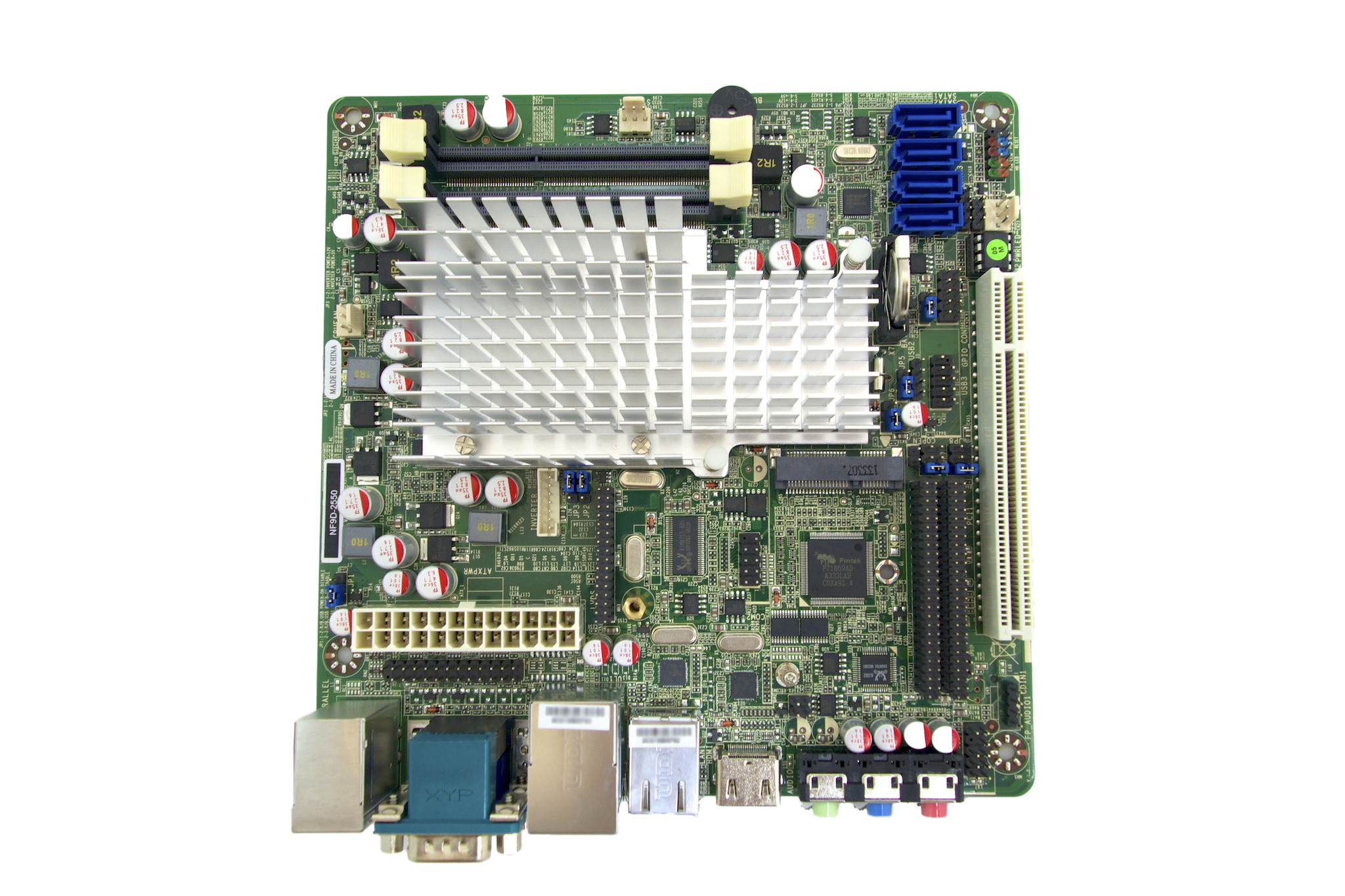
I have been writing a series of posts about building a small standalone pfSense box. The enclosure (casing) and the power supply has been covered. This one is now getting into the core of it — the motherboard itself. I’ve chosen to go with the Jetway NF9D-2550 mini-ITX motherboard, which includes the 1.86 GHz Intel Atom D2550 processor.
My goals with this box was outlined in Building a pfSense Mini-ITX Box. The criterion for small form factor, low power consumption, quiet and fanless, sort of narrows down the options to Intel Atom based mini-ITX motherboards. In particular, it will have to be one that preferably includes multiple LAN ports onboard, or had expansion options to incorporate multiple LAN ports within a small form factor enclosure.
Ultimately, my search led me to Jetway’s NF9D-2550 motherboard. Another pretty good option that I also considered is Jetway’s NF9I-2550 motherboard. The difference being that the former includes two onboard Realtek Gigabit Ethernet ports, while the latter has one onboard Intel Gigabit Ethernet port. The latter one costs more.
You may not have heard of Jetway before. They are not as well known as mainstream motherboard manufacturers like Asus or Gigabyte. Jetway’s focus is in the industrial and embedded PC market. Some of their products, like this NF9D-2550 motherboard, are designated Embedded Long-Life Series, which means they will have a minimum product availability of 5 years. The NF9D-2550 motherboard, for example, has a planned product life till Q4 of 2016. In some applications, people don’t want to have to worry about availability of replacement parts, or the complexities of changing to a similar part, in the event that something breaks.
The NF9D-2550 has the following features:
- Intel Cedar Trail-D Processor D2550 running at 1.86 GHz
- Intel NM10 chipset
- 2 slots of DDRIII 800/1066 MHz SO-DIMM with memory capacity expandable to 4GB
- 2x SATA II and 2x SATA III ports
- 2x Realtek RTL8111EVL Gigabit Ethernet ports
- Realtek ALC662-GR 6-channel audio codec with line-in, line-out and mic ports
- 1x serial port, 1x additional serial header
- 1x VGA port, 1x HDMI port, independent display
- 1x S/PDIF connector
- 4x USB 2.0 ports
- 1x additional 9-pin USB 2.0 header, 1x additional 4-pin USB 2.0 header
- 1x parallel header
- PS/2 keyboard and mouse combo port
- 24-bit single channel LVDS header
- Support watchdog function
- 1x 32-bit PCI slot, 1x mini-PCIe slot
- Jetway daughterboard header
This is quite a capable motherboard, with plenty of ports and additional onboard headers. With dual Gigabit Ethernet LAN ports on board, you can immediately build a basic router. The NF9D-2550 can build home theatre set top boxes, digital signage systems, interactive kiosks, network appliances, point-of-sales terminals, and it should also work for numerous other projects.
The expansion options really give you a lot of flexibility to add additional functionality to the system. For example, even though there is no Wi-Fi onboard, you can add a mini-PCIe wireless adapter, or a USB dongle if that’s what you prefer. Between the USB, PCI and mini-PCIe ports, you have plenty of add-on options on this motherboard. There is, unfortunately, no PCIe and no mSATA.
One interesting feature is the Jetway daughterboard header (the 4 rows of pins in the photo above). Jetway sells several daughterboards that can plug into this header. It’s sort of like a PCI expansion slot, except that it is proprietary to Jetway. I would prefer to go with a standard interconnect, unless there is something advantageous with Jetway’s version. I could not find any documentation about what’s so special about Jetway’s daughterboard header.
At any rate, Jetway daughterboards are designed to work and fit perfectly with their motherboard. The AD3RTLAN-G daughterboard, for example, adds 3x Realtek RTL8110SC Gigabit Ethernet ports, and the RJ45 sockets line up perfectly on the I/O shield. There are a variety of other daughterboard available, including ones that add RS-232/422/485 serial ports and LVDS headers.
Conclusion
The NF9D-2500 is a capable Atom D2550 mini-ITX motherboard suitable for numerous low-power embedded PC applications.
Pros:
- Low power Intel Atom D2550 processor
- Dual Gigabit Ethernet LAN ports onboard
- Plenty of onboard ports and headers
Cons:
- Use of proprietary Jetway daughterboard connector
